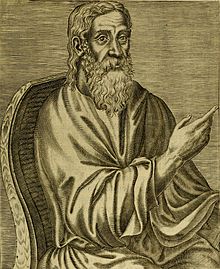Klemens wa Aleksandria
Titus Flavius Clemens (anayejulikana zaidi kama Klemens wa Aleksandria; kwa Kigiriki: Κλήμης Αλεξανδρεύς, Klemes Alexandreus; Athens, 150 hivi; Aleksandria, 215 hivi) alikuwa mwanafalsafa na mwanateolojia wa Ukristo katika mji wa Aleksandria (Misri) mwanzoni mwa karne ya 3[1].

Huhesabiwa kati ya walimu muhimu wa Kanisa la kwanza.
Anaheshimiwa na Waorthodoksi wa Mashariki, Waanglikana na wengineo kama mtakatifu.
Maisha
haririKlemens alikuwa mwenyeji wa Ugiriki aliyezaliwa katika familia ya wapagani matajiri mjini Athens.
Baada ya kupokea imani ya Kikristo, alisafiri akitembelea walimu Wakristo katika nchi mbalimbali kama vile Ugiriki, Italia na Palestina hadi Misri.
Huko alipewa nafasi ya kufundisha kwenye Chuo cha Kikristo cha Aleksandria akishirikiana na mwanzilishi wake Panteno.
Jitihada ya Klemens ilikuwa kupatanisha imani ya Kikristo na dhana za falsafa ya Kigiriki. Alifaulu kufafanua Ukristo kwa wasomi wapagani na kuvuta wengi kwenye imani yake mpya.
Klemens alikuwa ndiye mwalimu wa Origene.
Tazama pia
haririTanbihi
haririMaandishi
hariri- Opera Omnia by Migne Patrologia Graeca with analytical indexes and concordances
- Clement's Protrepticus Ilihifadhiwa 16 Mei 2013 kwenye Wayback Machine.
- Clement's Stromateis
- Clement's Paedagogus
- Hypotyposes
Marejeo
hariri- Ashwin-Siejkowski, Piotr (2010). Clement of Alexandria on trial: the evidence of "heresy" from Photius' Bibliotheca. Leiden: BRILL. ISBN 978-90-04-17627-0.
- Berger, Teresa (2011). Gender Differences and the Making of Liturgical History: Lifting a Veil on Liturgy's Past. Teresa Berger. London: Ashgate Publishing. ISBN 978-1-4094-2698-1.
- Bucur, Bogdan G. (2006). "The Other Clement of Alexandria: Cosmic Hierarchy and Interiorized Apocalypticism". Vigiliae Christianae. 60 (3): 251–268. JSTOR 20474764.
{{cite journal}}: Unknown parameter|month=ignored (help) - Burrus, Virginia (2010). Late Ancient Christianity. Philadelphia: Fortress Press. ISBN 978-0-8006-9720-4.
- Clark, Elizabeth Ann (1999). Reading renunciation: asceticism and Scripture in early Christianity. Princeton: Princeton University Press. ISBN 978-0-691-00512-6.
- Daniélou, Jean (1962). "Les traditions secrètes des Apôtres". Eranos Jahrbuch (31).
- Droge, Arthur J. (1989). Homer or Moses?: early Christian interpretations of the history of culture. Tuebingen: Mohr Siebeck. ISBN 978-3-16-145354-0.
- Ferguson, John (1974). Clement of Alexandria. New York: Ardent Media. ISBN 978-0-8057-2231-4.
- Grant, Robert McQueen (1988). Gods and the One God. Louisville: Westminster John Knox Press. ISBN 978-0-664-25011-9.
- Hägg, Henny Fiskå (2006). Clement of Alexandria and the beginnings of Christian apophaticism. Oxford: Oxford University Press. ISBN 978-0-19-928808-3.
- Heid, Stefan (2000). Celibacy in the early Church: the beginnings of a discipline of obligatory continence for clerics in East and West. San Francisco: Ignatius Press. ISBN 978-0-89870-800-4.
- Itter, Andrew C. (2009). Esoteric teaching in the Stromateis of Clement of Alexandria. Leiden: BRILL. ISBN 978-90-04-17482-5.
- Irvine, Martin (2006). The Making of Textual Culture: 'Grammatica' and Literary Theory 350–1100. Cambridge: Cambridge University Press. ISBN 978-0-521-03199-8.
- de Jáuregui, Miguel Herrero (2010). Orphism and Christianity in late antiquity. Berlin: Walter de Gruyter. ISBN 978-3-11-020633-3.
- Karavites, Peter (1999). Evil, freedom, and the road to perfection in Clement of Alexandria. Ledien: BRILL. ISBN 978-90-04-11238-4.
- Kaye, John (1835). Some account of the writings and opinions of Clement of Alexandria. London: J.G. & F. Rivington.
- Kochuthara, Shaji George (2007). The concept of sexual pleasure in the Catholic moral tradition. Rome: Gregorian University Press. ISBN 978-88-7839-100-0.
- Ma, Wonsuk (ed.) (2004). The spirit and spirituality: essays in honour of Russell P. Spittler, Volume 4. New York: Continuum International Publishing Group. ISBN 978-0-8264-7162-8.
{{cite book}}:|first=has generic name (help) - Murphy, Mable Gant (1941). Nature allusions in the works of Clement of Alexandria. Washington D.C.: The Catholic University of America Press.
- Ogliari, Donato (2003). Gratia et certamen: the relationship between grace and free will in the discussion of Augustine with the so-called semipelagians. Leuven: Peeters Publishers. ISBN 978-90-429-1351-6.
- Outler, Albert C. (1940). "The "Platonism" of Clement of Alexandria". The Journal of Religion. 20 (3): 217–240.
{{cite journal}}: Unknown parameter|month=ignored (help) - Osborn, Eric (1994). "Arguments for Faith in Clement of Alexandria". Vigiliae Christianae. 48 (1): 1–24.
{{cite journal}}: Unknown parameter|month=ignored (help) - Osborn, Eric (2008). Clement of Alexandria. Cambridge: Cambridge University Press. ISBN 978-0-521-09081-0.
- Schaff, Philip (ed.) (2007). Nicene and Post-Nicene Fathers Volume I – Eusebius: Church History, Life of Constantine the Great, Oration in Praise of Constantine. Cosimo. ISBN 978-1-60206-508-6.
{{cite book}}:|first=has generic name (help) - Seymour, Charles (1997). "On Choosing Hell". Religious Studies. 3 (33): 249–266. JSTOR 20008103.
{{cite journal}}: Unknown parameter|month=ignored (help) - Sharkey, Michael (ed.) (2009). International Theological Commission, Volume 2. San Francisco: Ignatius Press. ISBN 978-1-58617-226-8.
{{cite book}}:|first=has generic name (help) - Verhey, Allen (2011). The Christian Art of Dying: Learning from Jesus. Grand Rapids: William B. Eerdmans Publishing Company. ISBN 978-0-8028-6672-1.
- Young, Richard A. (1999). Is God a vegetarian?: Christianity, vegetarianism, and animal rights. Chicago: Open Court Publishing. ISBN 978-0-8126-9393-5.
Viungo vya nje
hariri- "Clement of Alexandria" by Francis P. Havey, in the Catholic Encyclopedia, 1908.
- Reinhold Koltz, Titi Flaui Clementis Alexandrini opera omnia (E.B. Schwickerti, Lipsiae 1831), Vol. 1, 2, 3, and 4.
- The role and view of Scripture in Clement of Alexandria Ilihifadhiwa 19 Machi 2014 kwenye Wayback Machine.